Welcome to the final instalment of Women SF Writers of the 1970s! In this piece, we look at women who debuted in the 1970s whose surnames begin with T, U, V, W, X, Y and Z (which I pronounce Zed.) Also, there are no women who debuted in the 1970s whose surnames began with U or Z (of whom I am aware).
Previous instalments in this series cover women writers with last names beginning with A through F, those beginning with G, those beginning with H, those beginning with I & J, those beginning with K, those beginning with L, those beginning with M, those beginning with N, O, and P and those beginning with R and S.
Alison Tellure
Alison Tellure had a very small but very memorable body of work. “Lord of All it Surveys,” “Skysinger,” “Green-Eyed Lady, Laughing Lady,” and “Low Midnight” are all set on an alien world dominated by a single, vast, godlike creature. Existence there is complicated by the presence of competing, considerably tinier beings not entirely unlike humans. Contributors over on my blog, More Words, Deeper Hole, dug up biographical details from old Analog Biologs and con appearances, but the exchange raised more questions than it answered. As far as I know, Tellure never had a single author collection, but readers might be able to track down the June 1977 issue of Analog, which contains “Lord of All it Surveys.”
Joyce Thompson
Joyce Thompson was a children’s author. The sole work of hers’ that I have encountered is The Blue Chair, set in a world where unparalleled medical services, up to and including immortality, are available to the deserving. The protagonist is, alas, not one of the deserving; the state will not even deign to treat what seems like to be cancer. All she can do is consider the life she has lived. This story is not quite as bleak as it may sound.
Joan D. Vinge
Joan D. Vinge’s “Eyes of Amber” provided the cover story for the June 1977 Analog. Not surprising because by then she had established herself as an author to follow.
The easiest works of Vinge’s for Tor.com readers to track down are the four works in her grand space opera: The Snow Queen, World’s End, The Summer Queen, and Tangled Up in Blue. Three of the books feature the struggle of a backward world to survive being the sole known source of immortality. The other book, the odd one out, World’s End, involves a supporting character from The Snow Queen who tries to rescue his undeserving brothers.
Andre Norton fans may find much to enjoy in Vinge’s Cat series: Psion, Catspaw, and Dreamfall.
While Vinge is strongest at novella lengths, all three of her short story collections—Fireship, Eyes of Amber, and Phoenix in the Ashes—are long out of print and predate some of her most interesting pieces. The Complete Short Work of Joan D. Vinge would fit into one nice sized tome. Some publisher should make it happen.
Élisabeth Vonarburg
Élisabeth Vonarburg was born in France and is resident in Quebec; unsurprisingly the first language of her novels is French. A mainstay of Canadian (or depending on your politics, Quebecois) science fiction, her works have been translated for those of us who cannot read French. She is sufficiently prolific that picking a benchmark work is difficult, but readers new to Vonarburg might try the variously titled Philip K. Dick Award-winning Chroniques du Pays des Mères, AKA In the Mother’s Land, AKA The Maerland Chronicles, set in a world transformed by disaster, one-sided gender ratios, and social evolution.
Cherry Wilder
I’ve read only a few of Cherry Wilder’s works; the ones I did read were first-rate. I honestly don’t know why I have not read more of her work. Three possible explanations:
- Reasonable explanation: perhaps her books never reached Waterloo County.
- Embarrassing explanation: could it be that young me didn’t want to be seen reading a book by someone named Cherry?
- Stupid explanation: I am relegating this to the part of the essay I don’t think people read. (See the List of Shame, below)
Her Torin trilogy—The Luck of Brin’s Five, The Nearest Fire, and The Tapestry Warriors—features a human shipwrecked on an alien world. He is adopted by a local family and becomes entangled in local politics. Recommended.
Connie Willis
Connie Willis has enough Hugo and Nebula Awards that their aggregate mass has to be taken into account by geodetic satellites. I first noticed her “Daisy in the Sun” (Galileo, November 1979), which I followed up with the collection Fire Watch. Younger readers may be more familiar with her novels, such as The University of Oxford time-travel series, whose central message seems to be that Oxford has profound, intractable communications issues. In addition to the novelette “Fire Watch,” the sequence includes Doomsday Book, To Say Nothing of the Dog, or How We Found the Bishop’s Bird Stump at Last, Blackout, and All Clear. To Say Nothing of the Dog is a comedy. The others, not so much.
As I have not read every author first active in the 1970s, every single one of these reviews has been followed with a list of shame. This is the last list for the 70s. It is doubtless incomplete. If you have other authors to suggest, or wish to suggest a particular work by a particular author, please let me know.
Buy the Book
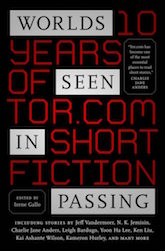

Worlds Seen in Passing: Ten Years of Tor.com Short Fiction
I appear to have overlooked a disproportionate number of women authors whose surnames began with T to Z. Could it be that because authors are shelved alphabetically, T through Z would tend to be on lower shelves and I simply never bothered to crouch down? This seems absurd but I have learned from seventeen years of running a game store that anything below knee level is invisible.
- S.L. Tannahill
- Barbara Talbot Taylor
- Jane Toombs
- Pamela Vincent
- Malvina G. Vogel
- Jenny Wagner
- Marjorie Warren
- B.F. Watkinson
- Lois June Wickstrom
- Mary Winter
- Jeanne Youngson
And that is that for women authors of the 1970s—which will no doubt come as a relief to the people who insisted I’d made my point and didn’t need to cover the whole alphabet. Time to start work on my next major series: Women Authors of the 1980s, A to Z.
(I wonder how long I can keep this up. If I live to a hundred, perhaps I will be penning surveys of women who first started publishing in the 2030s. If I am still capable of writing anything.)
In the words of Wikipedia editor TexasAndroid, prolific book reviewer and perennial Darwin Award nominee James Davis Nicoll is of “questionable notability.” His work has appeared in Publishers Weekly and Romantic Times as well as on his own websites, James Nicoll Reviews and Young People Read Old SFF (where he is assisted by editor Karen Lofstrom and web person Adrienne L. Travis). He is surprisingly flammable.










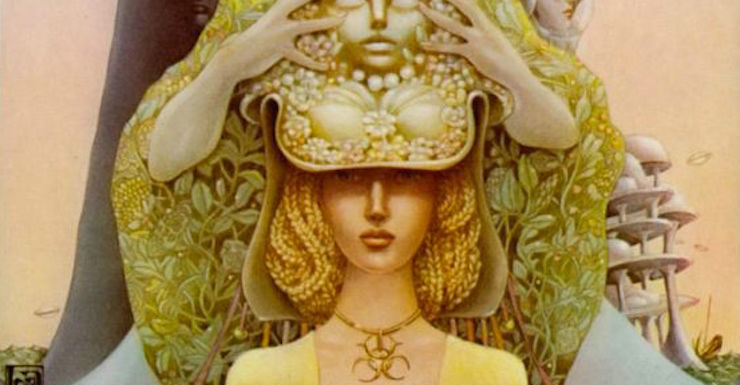
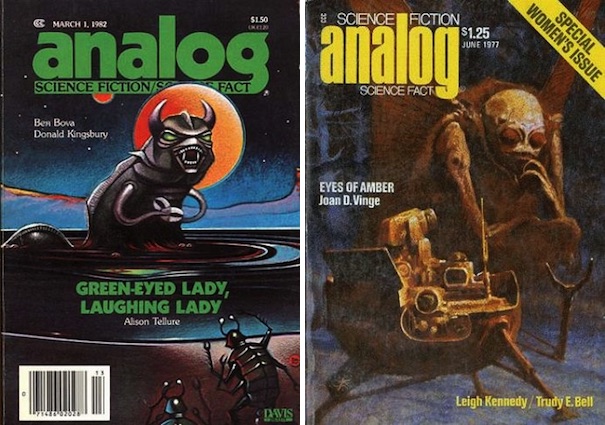
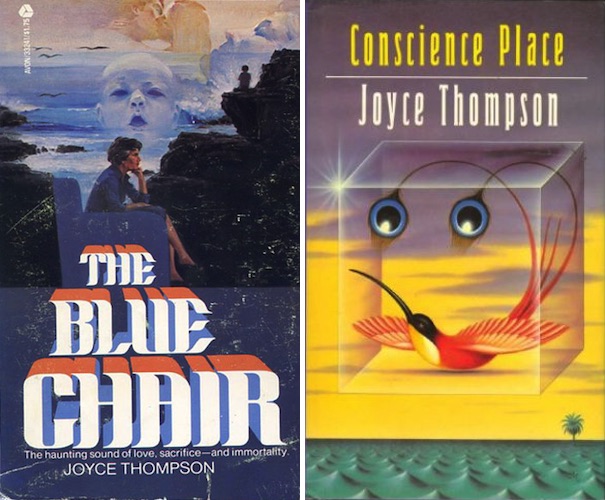
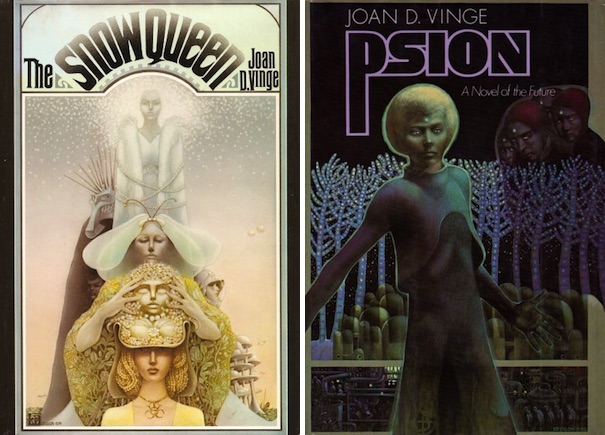
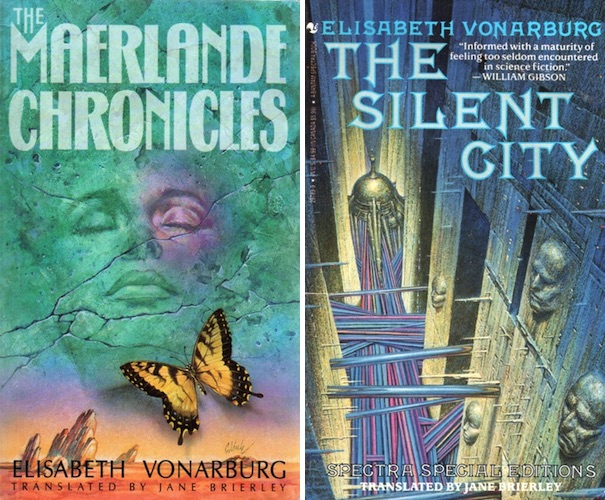
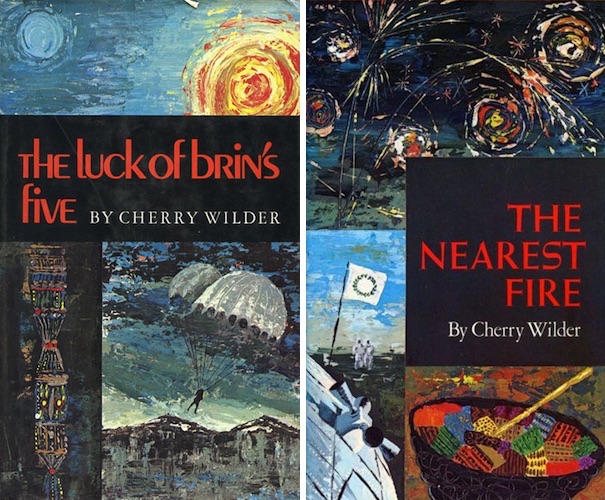
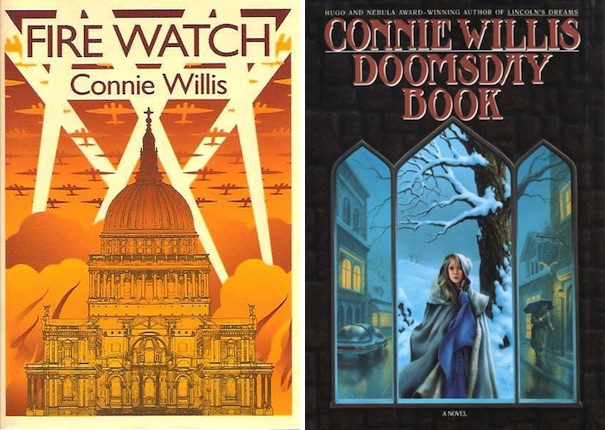
Just wanted to tell you how much I’ve enjoyed this series — it’s opened my eyes to some new (to me) authors, and made me revisit some old favorites. Looking forward to your Women Authors of the ’80s!
Thank you!
The first entry of Women of SF of the 1980s finished, so I am of course thinking about what to follow that series with. On the one hand, a look at the women of SF of the 1960s has much to commend it. On the other hand, I know there were more women active in the 1990s because that’s the shoals on which my Russ memes crashed. But a lot of people are nostalgic about the 1960s and surely nobody is old enough to nostalgic about the 1990s?
On another subject, do people prefer the Dillon or the Whelan cover for The Snow Queen?
Being involved in a nasty car accident didn’t help Vinge’s career. I remember being at the 2012 Chicon where she was supposed to be on this panel and the speculation was that she was going to need a ramp to get on the dais because the expectation was that she was going to be in a wheel chair. She came bustling in (on her own two feet) just after the panel commenced apologizing for running late!
I wonder, did anyone actually arrange a ramp JIC? But didn’t Vinge also get hit with fibromyalgia or am I thinking of another author? This whole making people of meat thing is a fundamentally flawed approach. People barely get started and then stuff stops working.
I found Doomsday Book astonishingly bad. Repetitive and weirdly theme-heavy, and the plot makes no sense.
As teen male in the 70’s in Canada all of my circle read many more female authors than male by a far stretch. I don’t remember any book burnings or female writers being dragged into the streets, and Ithink I’ve read almost everything you’ve covered, so I’m rather puzzled by this ‘erasure’.
I know Jane Toombs more as an ebook pioneer than as a sf/f writer. She was one of the first authors at Hard Shell Word Factory, one of the very first publishers to focus primarily on ebooks, and one of her romances was the first ebook reviewed by “Romance Reviews,” the major book review magazine of that period. She also was one of the founders of the ebook author group, EPIC. We lost her about five years ago. She was a gracious lady and a great loss for the industry.
How could you have forgotten Sheri S. Tepper? The Gate to Women’s Country , Grass , The Visitor – for example. She was an expert at world building and creating wonderful women. shame shame shame on you !!!!!!!!!!!
I remember reading all of Cherry Wilder’s books, maybe in mid to late 70s. I really liked them. I don’t still have any copies of them myself. I have given away so many of my fantasy books — too many long series to keep.
@8
Looks like Sheri S. Tepper wasn’t writing until the 80’s
@8: This series specifically covers writers who debuted in the 1970s–I could be wrong, but I believe Tepper first published genre poetry in the ’60s (under the name Sheri S. Eberhart), and then went on to publish her first novels in the 1980s. Perhaps someone else can confirm, but let’s check the facts (and maybe let’s all take it easy with the shame rhetoric, in the meantime :)
@8: Tepper debuted in the Eighties (if you don’t count poetry) or the Sixties (if you do), which I suppose a person could have looked up before rushing to shame-shame-shame someone.
Sheri S Tepper’s first book wasn’t published until 1983, and she is therefore ineligible for “writers of the 1970s”.
I was sure that Sharon Webb was a writer of the 1970s, but it looks like she had a credit in the 1960s (http://www.isfdb.org/cgi-bin/ea.cgi?1469).
Glad to see Alison Tellure remembered.
On to the 1980s…
I may have mentally shrieked with joy at seeing the header image. Much as I love the Whelan covers, that’s the cover of the edition I have of The Snow Queen :) My *favorite* series of books of all time. Thanks for putting this series of amazing authors together!
I have enjoyed seeing many old favourites mentioned in this series.
Just a comment on why some of these authors may be forgotten: I read the first 2 books of Jane Toombs Moonrunner series and was watching for years for the next book to continue the series and provide some continuing history/explanation/closure. I guess there was a third book many, many years later though I have not read it.
I know there are many reasons why series are not continued but it does leave readers hanging and less inclined to go back to that author on other series.
Thanks for running through the 1970s alphabet. Looking forward to the next project.
Egads! It’s almost as if someone has “unconsciously create[d] social systems that ignore or devalue women’s writing.” Joanna Russ’s playbook is still in use, I guess.
(I was going to mention the prolific Chelsea Quinn Yarbro as an author you missed, but according to Wikipedia, she got one publication (a short story) in 1969. Oh well – maybe when you get to the 1960s.)
I loved this series of reviews so much I was inspired to make a YouTube series! It’s called 20th Century Fem SFF, and I’m reviewing any SFF books written by women from the last century. Not just from the seventies, but still, most of my to-read list are books recommended in this column. If you want to check it out, the playlist is here. I start out being salty about Vanyel in Magic’s Pawn, and then won’t shut up about Terry Pratchett in my Tehanu review. It’s a lot of fun!
Mr Nicoll,
Have you done a series on forgotten sf/f women authors of the 1960s and before? I’m sure that there are quite a few, although I’d suspect many would be using gender-hiding initials or pseudonyms.
I prefer the Whelan Snow Queen cover, but my copy must have one of the worst covers the book ever got. (https://goo.gl/images/wRTD8C)
I met Joan Vinge at a con in NZ. She developed either ME/CFS or that combined with fibromyalgia. As a sufferer of the former for nearly 28 years now, it was especially lovely to meet her both as a favourite author and a fellow “sufferer” (can’t think of a better word right now).
18: Thank you very much!
19: I have not. That said, I live so much in the moment that even though I’ve only just sent in installment one of the 1980s phase of this I am thinking about what comes after that. I’m thinking of alternating women of the 1990s pieces with women of the 1960s.
The question “Do you prefer the ____ cover or the Whelan cover?” will be answered by me with the Whelan for almost any value filling in that blank. (Although I prefer the cover of The Summer Queen, which is one of my favorite pieces of art, period. I have prints of both framed and hanging on my bedroom wall, although the Summer Queen one is now sadly faded.)
I’m not sure of your criteria, but how did you miss Kate Wilhelm, who was active in the 70s and even award winning.
This series was of women whose first SF was in the 1970s and Wilhelm was active before the 1970s.
18. That link did not work for me. “Invalid parameters”.
Is this it?
https://www.youtube.com/watch?v=h7KWlIeruQE&list=PL3HESLDwnDx8HooxIMq23IoigBAZI8Dnk
May I publicize it?
@24: You mean “This series was of women whose first SF was in the 1970s and Wilhelm was active before the 1970s.” right?
aughyesaugh
I’m loving this series of articles, and I’m happy you are continuing it. To be honest, I really, really hope that if I get to be long lived, my eyes and brain stay with me so I can read to my last day (and maybe take advantage of retirement to put a dent in my tbr before then). If so, I reckon I’ll still be tracking these posts to mine for ideas (even if my tbr weeps under the strain).
@25 – yes, that’s correct! Thank you so much for checking and sorry the link didn’t work. Please feel free to publicize it.
The Dillon cover is the One True Snow Queen cover. For me, anyway.
Thanks for this series filled with names familiar, vaguely remembered, or completely new to me. I’ll be looking forward to the 1980s one.
Re: Allison Tellure, I see there is a photo of writer Rob Chilson on his website with a copyright 2018 ‘Alysen Tellure’
Looking past the 80s, I wonder if you should limit yourself to the 60s or maybe do the 50s and 60s combined. With just the 60s you’ll miss out on a few like the now largely forgotten Rosel George Brown. Or you could do the 60s as a standalone and then do a larger catchall from before then. Pre-60s numbers are likely to be a lot smaller, but could still be very instructive.
@20
mine, too. Awful. But a great book!
Is there some Lisa Tuttle isn’t on the list? (Her first short story was published in 1972, and she won the John W Campbell Award in 1974.)
I thought her first story was 1968’s How Long?
@35: You’re right, but that was in a fanzine. Her first pro sale was 1972,
In that case the answer is “I screwed up.” But I think I will still include her in the 1960 list because if I edit the piece now, many people will not see her entry.
Dominique Warfa is a friend of mine, and definitively not female. (That first name is non-gender-specific in French.)
Mr Nicoll,
As M. Durastanti noted, one must be careful with first names, especially those that are not English. One should also be aware that there are unisex names in English and names where the majority usage has switched gender.
When my wife was in nursing school, there was a patient who was admitted: his name was Michele, which the local monolingual people assumed was that of a woman. My wife noticed that he was born in Italy, and moved to the US in adulthood. “Michele” translates to “Michael” in English; it is a masculine name. Other Italian names guaranteed to confuse anglophones include Nicola (one of two Italian forms of Nicholas), Luca (Lucas), Piermaria, and Andrea.
And of course in English, many names have transitioned from masculine to feminine usage (Leslie, Jodi, Evelyn).
@40/Carl: Evelyn was originally female. According to Wiktionary, it became a surname at some point, and then the surname became a male given name.
…and quite a few are unisex or have become so.
Also, clueless parents (anyone who read much of anything would know Paris was male) or deliberate misspellings.
I think Mr Nicoll was using the isfdb database and determining gender by given name, and warned his reader that this wasn’t perfect. I don’t think the ifsdb database has a field whichspecifies gender.
The isfdb does not track gender and while I do use lots of other sources, in this case I screwed up. Thank you for pointing out my error to me.
@43,
I’ve dealt some issues with trying to automatically parse names; I used to write software for market research. It’s is a nightmare; issues include double surnames separated by a blank, like David Lloyd George (surname Lloyd George) and Simon Conway Morris, non-standard case, such as ffolkes, properly sorting names like Mac- vs Mc vs M’, whether a name like von Trapp should be sorted with v’s (sometimes) or t’s (other times)……
I’ve also had a male and female student (identified as such in their school records) both named Jordan in the same classroom.
Looking at a name and saying “male” or “female” has never been 100%, even when society’s view of gender was absolutely binary. See https://youtu.be/_Gbtm-93oqE (“A boy named Sue.”)
@swampyankee, “… double surnames separated by a blank …” You mean like a couple of rather well-known, Hugo-winning Tor editors?
@45,
Them, too. JDN’s search for forgotten and erased female sff authors relies on some pretty sketchy biographical information, so he will miss some women and may include some men. I think his task will get harder when he goes into earlier writers.
Huh. It turns out I did encounter Toombs! The cover of the Fog Maiden was instantly familiar once I found a copy.